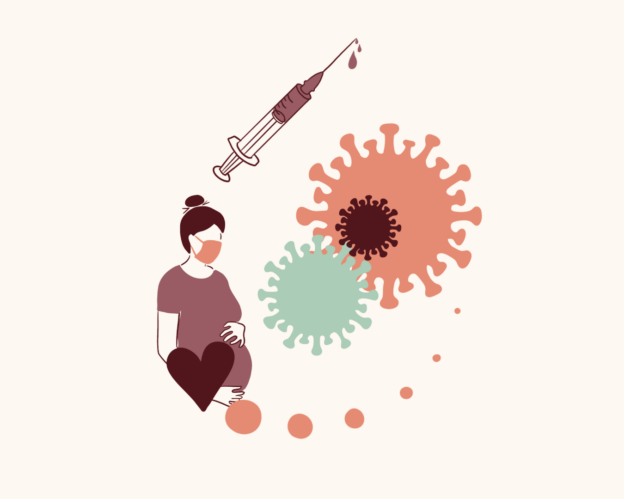
Geschreven door: Margot van Dijk
Gepubliceerd op: 4 november 2021
Laatste update: 2 april 2024
Dit artikel wordt in 2026 weer opnieuw herzien vanwege nieuwe onderzoeken met behoorlijk andere uitkomsten dan de onderzoeken tot nu toe. Echter zijn deze onderzoeken nog niet niet peer-reviewed, maar daarna worden ze meegenomen in dit artikel.
In januari 2021 begon in Nederland de eerste grootschalige vaccinatiecampagne tegen COVID-19 (de ‘coronaprik’). Uit cijfers van het RIVM blijkt dat er tot half februari 2022 (in maart 2022 vervielen de meeste maatregelen) in Nederland naar schatting zo’n 24,9 miljoen vaccinaties zijn toegediend. De GGD registreert niet of vrouwen zwanger zijn en er is ook geen centrale registratie voor/door zorgverleners. Naar schatting heeft ongeveer 50% van de zwangere vrouwen in Nederland zich laten vaccineren. Er zijn ongeveer 170.000 vrouwen zwanger per jaar in Nederland.
In eerste instantie werd de coronaprik voor gezonde zwangeren afgeraden, omdat de vaccins niet op zwangeren getest waren. In april 2021 werd dat advies aangepast, omdat uit onderzoek zou blijken dat zwangeren een hoger risico hadden op complicaties bij een covid-infectie. Ondertussen zijn wereldwijd miljoenen zwangeren gevaccineerd. Het is niet duidelijk hoeveel Nederlandse zwangeren een coronaprik hebben gekregen. Er zijn grote verschillen in vaccinatiegraad tussen verschillende landen (Glanis, 2022): eind maart 2022 was de gemiddelde vaccinatiegraad wereldwijd 27.5%, variërend van 7% tot 68,7%.
Vanaf half juni 2023 kregen zwangeren het advies om rond de 22 weken zwangerschap eenmalig een covid-vacinatie of booster (bij eerdere vaccinatie) te halen. Onlangs (maart 2024) verviel dit advies; volgens de Gezondheidsraad is het risico voor zwangeren op ernstige ziekte en vroeggeboorte heel laag door de opgebouwde groepsimmuniteit.
Dit artikel is niet bedoeld om een advies te geven voor of tegen vaccineren. Die keuze ligt bij jezelf.
Auger, N., 2022, Omicron in pregnancy: time to breathe easier?, https://www.ncbi.nlm.nih.gov/pmc/articles/PMC9544937/
Ciapponi, A. et al, 2023, Safety of COVID-19 vaccines during pregnancy: A systematic review and meta-analysis, https://pubmed.ncbi.nlm.nih.gov/37012114/
Darney, B. et al, 2023, Impact of coronavirus disease 2019 (COVID-19) vaccination on menstrual bleeding quantity: An observational cohort study, https://obgyn.onlinelibrary.wiley.com/doi/10.1111/1471-0528.17471
Husen, M. et al, 2021, Unique Severe COVID-19 Placental Signature Independent of Severity of Clinical Maternal Symptoms, https://pubmed.ncbi.nlm.nih.gov/34452534/
Jorgenson, S. et al, 2023, Newborn and Early Infant Outcomes Following Maternal COVID-19 Vaccination During Pregnancy, https://pubmed.ncbi.nlm.nih.gov/37870875/
Galanis, P. et al, 2022, Uptake of COVID-19 Vaccines among Pregnant Women: A Systematic Review and Meta-Analysis, https://www.ncbi.nlm.nih.gov/pmc/articles/PMC9145279/
Torch, F., Nobles, J., 2023, Vaccination, immunity, and the changing impact of COVID-19 on infant health,https://www.pnas.org/doi/abs/10.1073/pnas.2311573120
Marchand, G. et al., 2023, Maternal and neonatal outcomes of COVID-19 vaccination during pregnancy, a systematic review and meta-analysis, https://pubmed.ncbi.nlm.nih.gov/37454153/
Munoz, F. et al, 2022, COVID-19 booster vaccination during pregnancy enhances maternal binding and neutralizing antibody responses and transplacental antibody transfer to the newborn (DMID 21-0004), https://pubmed.ncbi.nlm.nih.gov/35734087/
Schwartz, D. et al, 2022, Placental Tissue Destruction and Insufficiency From COVID-19 Causes Stillbirth and Neonatal Death From Hypoxic-Ischemic Injury: A Study of 68 Cases With SARS-CoV-2 Placentitis From 12 Countries, https://meridian.allenpress.com/aplm/article/146/6/660/477699/Placental-Tissue-Destruction-and-Insufficiency
Toktas, I, 2023, Examining the effect of COVID-19 vaccines on the menstrual cycle: A study from Turkey, https://www.ncbi.nlm.nih.gov/pmc/articles/PMC10727619/
Rimmer, M. et al, 2023, The risk of miscarriage following COVID-19 vaccination: a systematic review and meta-analysis, https://www.ncbi.nlm.nih.gov/pmc/articles/PMC10152171/
RIVM, uitvoeringsrichtlijn COVID 19-vaccinatie, versie 2 januari 2024 (27 februari geraadpleegd), https://lci.rivm.nl/richtlijnen/covid-19-vaccinatie#2-4-vaccineren-tijdens-de-zwangerschap
Piekos, S. et al, 2023, Effect of COVID-19 vaccination and booster on maternal–fetal outcomes: a retrospective cohort study, https://www.thelancet.com/journals/landig/article/PIIS2589-7500(23)00093-6/fulltext
Perron, L., 2021, Nederlands Tijdschrift voor Geneeskunde, Het gebruik van de coronazelftest in perspectief
https://www.ntvg.nl/artikelen/het-gebruik-van-de-coronazelftest-perspectief#lb-8
Villar, J. et al, 2023, Pregnancy outcomes and vaccine effectiveness during the period of omicron as the variant of concern, INTERCOVID-2022: a multinational, observational study, https://pubmed.ncbi.nlm.nih.gov/36669520/
Wesselink,A. et al, 2022, A Prospective Cohort Study of COVID-19 Vaccination, SARS-CoV-2 Infection, and Fertility, https://academic.oup.com/aje/article/191/8/1383/6511811
Wesselink, A. et al, 2023, COVID-19 vaccination and menstrual cycle characteristics: A prospective cohort study, https://www.sciencedirect.com/science/article/pii/S0264410X23006813?via%3Dihub
Woestenberg, P. et al, 2023, Maternal first trimester COVID-19 vaccination and risk of major non-genetic congenital anomalies, https://onlinelibrary.wiley.com/doi/10.1002/bdr2.2251
Woestenberg, P. et al, 2022, Nederlands Tijdschrift voor Geneeskunde, Maternale bijwerkingen na covid-19-vaccinatie in de zwangerschap, https://www.ntvg.nl/artikelen/maternale-bijwerkingen-na-covid-19-vaccinatie-de-zwangerschap#resultaten
Tosto, V. et al, 2023, SARS-CoV-2 Footprints in the Placenta: What We Know after Three Years of the Pandemic, https://www.ncbi.nlm.nih.gov/pmc/articles/PMC10142804/
>




Reacties